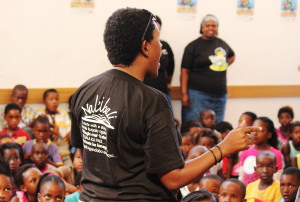 People have told stories for centuries to explore ideas and make sense of their experiences. In fact, sharing stories is as natural to human beings as eating and sleeping! Some of the stories we tell today have been passed down from generation to generation, while others are new ones that we create ourselves.
People have told stories for centuries to explore ideas and make sense of their experiences. In fact, sharing stories is as natural to human beings as eating and sleeping! Some of the stories we tell today have been passed down from generation to generation, while others are new ones that we create ourselves.
Making time to tell your children stories can be fun and satisfying for everyone. It also lets your children know that you value spending this time with them. But storytelling has other great benefits too. Here are some of them:
* Storytelling is a great way to teach children the life lessons you want them to learn. Great stories allow children to explore and think about love, hate, jealousy, kindness, power, good and evil.
* Storytelling stimulates children’s imagination and their use of language.
* Stories can transport and connect them to the lives of people they’ve never known, who come from long ago and places faraway.
* Telling stories about your childhood experiences helps your children to connect with you.
So, how do you get going? Well, it’s always easiest to start with stories that you know. Also, think about which stories will interest your listeners and what is appropriate for their ages. For example: you wouldn’t tell a ghost story to three year olds, but teenagers might enjoy it! Build up a bank of stories to tell and then keep finding new ones by looking in books or on the Internet. Translate and adapt stories that may only be available in one language. Keep them in a special folder or a book.
Practise telling a story by telling it to yourself until you know it well. Then, as you tell it to others, remember that your voice and your body are your main tools! Use them to create pictures in the minds of your listeners by using:
* interesting and expressive words
* facial expressions, like scowling to show how angry a character is
* gestures, like stretching out your arms to show how wide something is
* expression in your voice that gives different characters, different sounding voices, like a soft voice for a shy character.
But, most of all, remember that if you enjoying telling a story, there is a good chance that your audience will enjoy listening to it!

